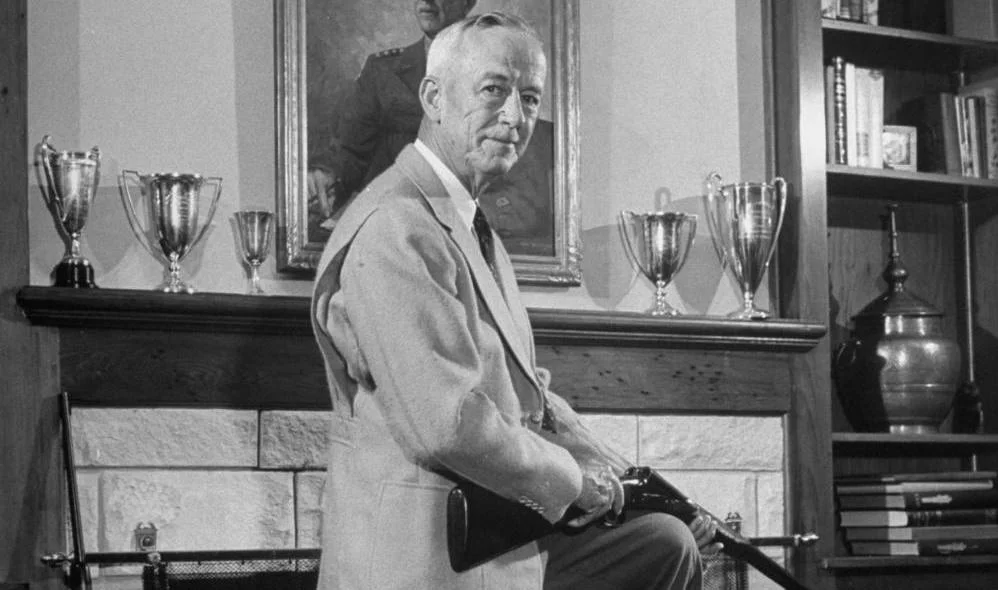General Courtney Hicks Hodges
- Mar 29, 2024
- 7 min read
Updated: Aug 24, 2025

Courtney Hicks Hodges (born January 5, 1887, Perry, Georgia, U.S.—died January 16, 1966, San Antonio, Texas) American army officer who led the First Army across western Europe in 1944–45 during World War II.
Hodges enlisted in the army in 1906 as a private and earned a commission as a second lieutenant in 1909. He was with General John J. Pershing’s punitive expedition into Mexico in 1916, fought in France during World War I, and served in the army of occupation in Germany in 1919. During the interwar years he studied at the Command and General Staff School, Fort Leavenworth, Kansas, and at the Army War College, Washington, D.C. He was promoted to brigadier general (1940) and major general (1941) after having trained large numbers of infantry troops at Fort Benning, Georgia. After being promoted to lieutenant general (1943), he was named commander of the Third Army, which he took to England in January 1944. There he became deputy to General Omar Bradley, commander of the First Army, which was preparing to take part in the Normandy Invasion.
In August, after the invasion, the U.S. forces in northern France were reorganized into the Twelfth Army Group under Bradley, and Hodges succeeded to command of the First Army. The First Army helped to liberate Paris, swept through Luxembourg and southern Belgium, was the first to breach the Siegfried Line (Germany’s fortified western frontier), and captured the German city of Aachen. Hodges’s army bore the full weight of the German counteroffensive through the Ardennes (December 1944) and held the northern portion of the American lines in the ensuing Battle of the Bulge. Units of the First Army captured the bridge over the Rhine River at Remagen in March 1945, helped encircle a large German force in the Ruhr region, and in April linked up with the Soviet Red Army at Torgau, Germany.
With the war in the European theatre ended, Hodges was transferred to the Pacific, where his army was expected to take part in the invasion of Japan. The war’s end relieved him of this responsibility, however, and he returned to the United States. Hodges retired from the army in 1949.
In Honor of Good Fortune and Great Commitment
Author: Dr. Andrew B. Denison (Germany)
Standing at the bridge towers, looking across the fast-flowing Rhine River, once spanned by the enormous Ludendorff Bridge, my thoughts drift back to those days in the spring of 1945 when war raged across the European continent.

On Nazi Germany´s western border, the Rhine stood in the way of seizing this war-ravaged country, of putting an end to the abominable Third Reich.
Here, on the banks of this ancient river, good fortune offered itself for a moment, at midday, on a drizzly Wednesday, the seventh of March 1945. Bedraggled forward elements of the US 9th Armored Division, standing on a hill above the spires of the St. Appolonaris church, looked down and saw an intact bridge. Here was access to the eastern bank and all that lay beyond. It was not part of the plan, but a certain Lt. Timmerman got a fortunate go from a lucky General by the name of William M. Hoge. Soon the bridge was theirs.
Good fortune in time of war is but a brief reprieve from the all-pervasive tragedy.
The war took its toll on this place, the town of Remagen. Its inhabitants died, buried and burned, as fire fell from the sky, trying to claw away that bridge. “That damned bridge” to those who suffered under interminable bombing.
Then the bridge was in American hands.
Men—in squads, platoons, companies, then battalions and regiments, of the 9th Armored, the 9th, the 78th, the 99th, —they rushed across the span. Ten long days, 240 hours, the bridge bore the heavy burden, the stomp of weary feet, the rattle and roar of an unending column of vehicles weighted down with the implements of war. Worth its weight in Gold, reckoned the Supreme Commander, General Dwight D. Eisenhower. Then the bridge collapsed into the cold, dark Rhine, taking 28 young men with it.
The bridge gone, but the crossing accomplished, Allied forces found themselves favorably poised for the final push, deep into the German heartland.
Yet the good fortune the bridge offered up would be naught for the great commitment of these men, of these soldiers, just arrived as replacements, or lucky enough to have survived the whole ride.
They assembled here in Remagen—under fire. They crossed the river—under fire. They advanced into the bridgehead on the other side—under fire. They lost their lives—under fire.
They saw their bodies broken, blasted by concussion, cut by burning steel; these young men in a faraway place, a place that saw horror in those days, a place the survivors would never forget.
A place, today, of bucolic beauty, the calming rhythms of this river Rhine soothing the frequent visitors. Here in Remagen, cheery guests enjoy the Rhine of boats and bicycles, the Rhine of good wine, the Rhine of Romance—Vater Rhein. It is a happy place, yet also a place in the shadow of those bloody days of March, where good fortune and great commitment met to make history, to make a better future.
Ferocious fighting extended over three weeks before these American soldiers broke through the final lines of Wehrmacht resistance. The breakout that followed led to one of the greatest encirclements of military history—known as the Ruhr Pocket. Had there been no Remagen Wonder, there would have been no Ruhr Pocket, and maybe no Germany like we know today.
Good fortune in time of tragedy, this crossing. A crossing also made possible by the great commitment of those men in those crucial days, to whom we as Americans and Germans owe a great debt of gratitude.
To have thought, back then, in 1945, that Germans and Americans would stand together today on a continent at peace, in an expanding Europe of freedom and democracy, a Europe of prosperity and generosity, such as history has never seen—to have imagined such things back then would have been starry-eyed indeed.
Yet Europe and America joined together, with good fortune and great commitment, through decades of reconstruction and division, Free Berlin, surrounded by a sea of red, by tank armies that came with Stalin and left with Gorbachev. Europeans and Americans saw off the Cold War, opened up the Iron Curtain, and gained German unification in freedom. Much of the former Soviet empire came into the Atlantic world.
Despite enduring troubles on the horizon, good fortune and great commitment turned the Germany of 1945 into the Germany of 2025. The Germany I live in today is a good place. I reside in the small village of Pleiserhohn—twenty kilometres north of the bridge, twenty kilometres of wooded hills and deep ravines, twenty kilometers that US riflemen took two weeks of heavy fighting to move across. That was then.
The Germany in which my children are growing up, this Germany is a friendly, warm, humane and generous place—it is a society enjoying the fruits of freedom and good government in a peaceful and united Europe. It is a place I have come to love like my own country.
In a sense, the most remarkable thing about World War II was the Peace that followed, for it has endured and grown and come to define the standard to which much of the world aspires. Like a Phoenix rising from the ashes of two world wars, Europe and America have together succeeded in creating peace and freedom and prosperity like the world has never seen – endangered as it may be.
Memory of war rouses the hope for peace. Good fortune and great commitment can make peace possible. Peace requires good fortune, for peace is difficult. Peace requires great commitment, for peace is expensive. So it will also be in Ukraine and the Middle East.
In Remagen in the twin towers of what was once the Ludendorff Bridge, there is a museum about war and about the hope for peace. The rooms of this museum have come to be a great span in the great bridge across the Atlantic. In its towers, Americans and Europeans and other citizens of the world meet to remember and to hope, to turn their hearts and minds to those parts of the world, today still torn by war—like this place was on those terrible, triumphant days of March, 1945.
In the 40 years since its founding, the museum and its mission have come to be a part of this place. This museum has opened many eyes and many hearts, remembering war and speaking for peace under the motto, „Laßt uns jeden Tag mit Geist und Verstand für den Frieden arbeiten. Beginne jeder bei sich selbst“. Let us work each day, with mind and soul, for peace. Let each begin with himself. The bridges built by this museum have been sustained by many worthy individuals of good fortune and great commitment. We honor these bridgebuilders.
Eighty years ago, on the 7th of March 1945, young American soldiers began crossing the Rhine. The fires of war were to burn across Europe for another 61 long days, before finally being doused on the day of days, the Eighth of May. VE Day, the day that celebrate war´s end in the “old country,” in the cradle of civilization—in Europe.
Every day, the museum celebrates the new beginnings the war made possible. The museum celebrates the good fortune and great commitment of those who achieved so much—at such great cost. The museum honors those who bore that great burden, men who have lived long lives, always in the shadow of those haunting days that marred their youth.
They have, I hope, also lived in the knowledge that the Atlantic Miracle was of their making, that the peace that has unfolded in Europe over all these decades, that this peace was their peace.
With good fortune and great commitment, my generation, and that of my children, will be able to take up this legacy, to broaden this Atlantic peace into a truly global peace.
In rising to this challenge, we can be but strengthened by the miracle Europe has become, and by the good fortune and great commitment of those who won the war and then went on to win the peace.
See our article on General Hodges Home.












